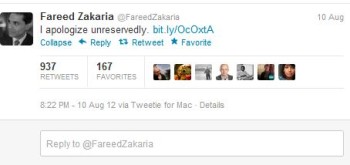
Fareed Zakaria said "I apologize unreservedly" last week after it was revealed his column had "close similarities" to a New Yorker article. (Credit: Twitter, screenshot)
Fareed Zakaria has been accused of lifting a quote for his 2008 book The Post-American World from a 2005 book by Clyde V. Prestowitz, the Washington Post‘s Paul Farhi reported.
Zakaria was suspended last week by CNN and Time after his Time column was busted for having “close similarities” to an April article in the New Yorker, as we wrote. Zakaria apologized for his “serious lapse.” As we wrote earlier, the Washington Post said it was reviewing Zakaria’s work for the newspaper. According to this new Post report, Zakaria’s column “will not appear this month.”
Prestowitz spotted the lack of attribution in Zakaria’s The Post-American World’s first and paperback editions, and said that when Zakaria’s book was first published he immediately “contacted Zakaria…but received no response.” According to the Post, the quote is attributed to Prestowitz’s Three Billion New Capitalists: The Great Shift of Wealth And Power to the East “in the footnotes of” the book’s “updated and expanded version.”
While Prestowitz called for an apology, Zakaria argued he was “following standard practice,” the Washington Post reported. Zakaria is quoted as saying:
“As I write explicitly [in the book], this is not an academic work where everything has to be acknowledged and footnoted…Please look at other books in this genre and you will notice that I’m following standard practice…People are piling on with every grudge or vendetta. The charge is totally bogus.”
In response to Zakaria’s comment to the Post, Prestowitz told iMediaEthics that
“I don’t agree that it’s standard practice to take a quote that is in quotation marks in one book and insert it with quotation marks into another book without attribution. To characterize my request for the application of what is, in fact, standard practice as ‘piling on’ and as a grudge or vendetta is a strange way to talk when a simple acknowledgement of error and apology would have snuffed out the whole discussion.”
We asked Prestowitz about the footnoted attribution that was added to Zakaria’s revised book, and if he publicized the incident back in 2008 or only recently given the attention directed toward reviewing Zakaria’s work. He told us that he’s “not sure why the update includes an attribution or why it’s included under a footnote to Tom Friedman’s book rather than a separately end-noted attribution on its own. It is, in fact, a rather strange attribution of a kind I have never seen before.”
Concerning publicizing the incident, Prestowitz said that at the time, when he alerted his “editor and literary agent” as well as Zakaria to the quote issue, “we were assuming that it was all just something that got missed in the normal rush of publishing. So we didn’t take any further steps. When the new incident became public, I realized that perhaps more than rush and carelessness had been at work.”
Prestowitz added: “I was a bit taken aback by Fareed’s comment that what he did is standard practice and that there are ‘hundreds of comments and quotes’ in his work that are not attributed.”
UPDATE: 8/14/2012 4:44 PM EST: Updated to include Presowitz’s response to iMediaEthics.
UPDATE: 8/15/2012 10:20 PM EST: The Washington Post corrected its article after the Daily Beast revealed that Prestowitz was credited in Zakaria’s book. Prestowitz apologized in a statement he sent to iMediaEthics.






